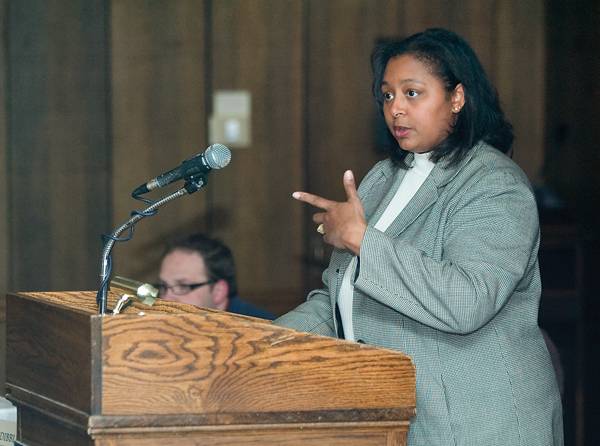Regents to review new sexual misconduct policy

Iowa State University Dean of Students, Dione Somerville, addresses the Government of the Student Body senate on Wednesday, November 19, 2008 in the Campanille Room of the Memorial Union. Somerville outlined the university’s new sexual misconduct policy and fielded questions from senators on issues such as the sexual harrassment issues at the University of Iowa. Photo: Ross Boettcher/Iowa State Daily
December 11, 2008
The Iowa Board of Regents will review amendments to the university’s existing sexual misconduct policy on Thursday.
At their September meeting, the Regents requested all of the state’s universities to review their policies, make revisions and report back to the Board in December.
Dione Somerville, dean of students, said the biggest change to Iowa State’s policy is having “one centralized location” for students affected by sexual misconduct, assault or harassment.
“When I look at the policy, it really is a compilation of a lot of existing information, resources and services that were already present in different places on campus,” Somerville said. “It provides one place where people can go to find information regarding our sexual misconduct policy.”
According to the Regents’ “Sexual Misconduct Guiding Principles,” the university is to “designate a primary institutional employee or an office to coordinate all sexual misconduct, including specific contact information.” The coordinating office at Iowa State will be the Dean of Students office.
Although the new policy would create one location for students, Somerville stressed that this does not mean students only have one location to go to report abuse.
“We’ll be the office that will coordinate the efforts regarding sexual assault and sexual misconduct. That does not mean, however, that students have to come to us first,” Somerville said.
She said students can always report misconduct to the police, Mary Greeley Medical Center, ACCESS and others first.
“Our role is really to coordinate that process, to make sure students are taken care of throughout the process, that they understand the process and really to preserve the options for them throughout,” Somerville said. “And to make sure that everyone’s needs are being met, that the victim is cared for, and in a very different way, the accused is being cared for.”
She said the new policy will not take away a student’s freedom of choice of where to report because there are some things the Dean of Students office cannot do that other campus resources can.
“The Dean of Students office can’t do a rape kit, we cannot take a police statement. All those things are still very valuable services that are offered other places,” Somerville said. “All of those places are still open and available for students, it’s just that the Dean of Students office is the office responsible for coordinating the process, and we do encourage people to report.”
She said a common misconception victims have is if they report abuse, they are required to file criminal proceedings.
“Reporting does not mean that you need to pursue criminal charges, reporting does not mean you need to pursue judicial charges,” Somerville said. “Reporting does not mean that there’s going to be this moniker that will follow you throughout your collegiate career.”
Somerville said some information has to be shared, but the process is still very private, covered by the Federal Education Rights and Privacy Act and depends on how much information the student is comfortable sharing.
“A student shouldn’t worry that if they report to the Dean of Students office, the next time their adviser opens up AccessPlus that information would be there,” Somerville said. “We want students to understand that those processes are still very private and confidential within the law.”
She said besides the single coordinating office, the rest of the process will be very “seamless” to students, because some of the policy won’t change, but will just have more depth.
“Our policy, as the draft stands now, just really spells out in a lot more detail what we mean,” Somerville said. “It also has attached to it a lot of resources. Those resources were there prior to the writing of this policy, the student disciplinary regulations were here prior to the writing of the policy, and so it really is one place, though, where there is a compilation of information.”
Somerville said the policy is currently in draft and will be until the board approves it.
Where to go for help or to report abuse:
— ACCESS — Assault Care Center Extending Shelter and Support
— SART — Story County Sexual Assault Response Team
— Student Counseling Services
— Thielen Student Health Center
— Dean of Students office
— Equal Opportunity and Diversity office
— Margaret Sloss Women’s Center
— ISU Department of Public Safety
— Mary Greeley Medical Center
— Planned Parenthood of Ames
— Ames Police Department
— Story County Sheriff’s Office
— Story County Attorney’s Office
All information taken from the Iowa State Sexual Misconduct, Sexual Assault and Sexual Harassment Involving Students Policy
















